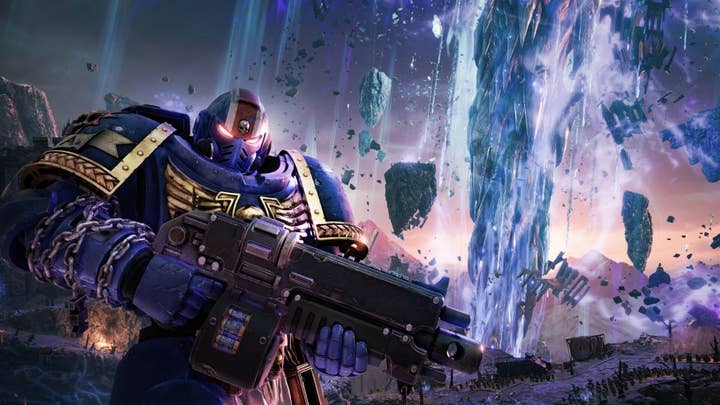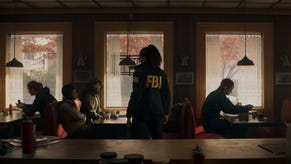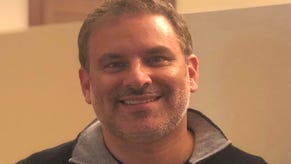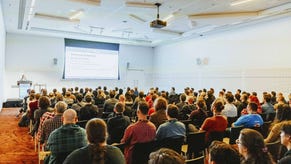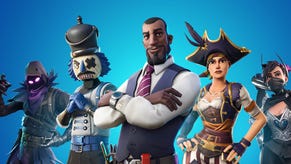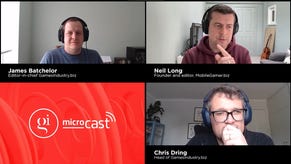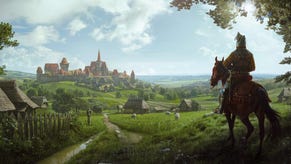Saber's Matthew Karch: "The AAA model is going to change"
CEO discusses the challenges facing AAA and how developers can lower their costs, plus more on reclaiming independence from Embracer
Sign up for the GI Daily here to get the biggest news straight to your inbox
The games industry's current troubles have been well documented by this point and, looking at the release slate for the rest of the year, you'd be forgiven for thinking there's not much cause for optimism on the horizon.
While there are still a number of AAA games heading to consoles and PC by the end of the year, it's currently a quieter line-up than we would historically expect and some heavy hitters that are most likely to move the needle, such as Grand Theft Auto 6, aren't due until next year. The release of new platforms usually injects capital into the market and fuels opportunities for growth but the next such launch — Nintendo's successor to the Switch — is also not expected until 2025.
Saber Interactive CEO Matthew Karch believes this is not just down to the current downsizing of the industry, but also to flaws in the AAA model that brings in the most revenue.
"Games are getting cut left and right, so there's going to be a situation – and I think it's already starting this Christmas – where you're going to see a real scarcity of games," he tells GamesIndustry.biz. "There's less coming out. The consolidation that's been going on in the industry is gonna hurt that as well, and the costs and the turmoil that the industry has been going through… Teams will regroup but the capital at the moment, it just isn't there. And so the industry is actually contracting somewhat and the supply of content is going to be way short of the demand."
Despite this grim outlook, he believes Saber Interactive — the company he co-founded in 2001, which has reclaimed its independence after being sold by Embracer Group — will be able to thrive thanks to a steady flow of titles in its pipeline and "being able to produce games at a price point where we can be adaptable with the way we bring those games to the market." And the price point is a crucial factor for Karch.
"We don't have to sell a game for $70," he says. "I'd prefer not to, I think that's expensive, I don't like that. It's almost not fair. Part of the reason Helldivers 2 has had the success that it's had [is] because it comes in at a much lower price point and it's accessible.

"Five years ago, all you heard about was the next Assassin's Creed or the next Call of Duty, Far Cry, Battlefield, or whatever else it was; the whole industry waited with bated breath for those games to come out, those were the juggernauts. But now you're seeing stuff like Palworld, Helldivers 2, and Valheim coming out and killing it. People are realising that there's [an] opportunity to make great entertainment at a price that isn't going to kill somebody's bank account."
Saber's biggest upcoming game this year is Warhammer 40,000: Space Marine 2, a title that Karch describes as "head and shoulders above anything Saber has ever done." He believes the game will put the studio into "an elite category" in terms of what it's capable of delivering.
Despite Karch's critiques of the current AAA pricing standards, Space Marine 2 will still be priced at $70.
"I mean, Focus [now Pullup Entertainment] is the publisher and we’re the developer but this is Saber’s game, [and] I would love to sell that – at least the digital edition – for less than $70 because we can, and I think we should," he says. "If you do games that look,feel and play as good as this… it shouldn't matter how much money you spent on the game. What should matter is how many man months were put into that game, what were the resources put into that game, right?"
Karch argues that AAA development is trapped in a vicious cycle: games become more expensive to make, so companies charge more for them. This means the titles generate more revenue, and if they don't, the company makes fewer of those types of games. Subscription and other forms of revenue generation have also put pressure on the traditional model, he adds.
The Saber Interactive CEO also discusses rising AAA budgets, with blockbuster games often costing hundreds of millions of dollars. Last year, for example, we learned both The Last of Us Part 2 and Horizon Forbidden West cost Sony over $200 million to make.
"I know the business of keeping costs under control, and making games which can compete with others for budgets that would make EA or Take-Two cry"
"The reason AAA is so expensive is because everybody insists on doing AAA in the most expensive territories in the world.
"If you're Activision and you're making a billion dollars, you don't care that you just spent $250 million making the game, right? But how many games that have huge spends go on to fail? A lot, which is why there's going to be a change in the model."
He points to Saber's work on the Halo Master Chief Collection, including the development of Halo: Combat Evolved Anniversary.
"I can tell you with 100% certainty that our budget for Master Chief Collection was certainly one-twentieth of Halo Infinite, but probably more like one-thirtieth or one-fortieth. And I would imagine they're equally successful.
"So there's a way to keep your costs down, just by being smart about the way you develop it and acknowledging the fact that games are a global industry and there are people in Buenos Aires, Serbia, Poland, who all play the same games that we play, and they can make them."
These are not territories chosen at random. Saber Interactive has staff across 15 locations around the world, and he says that where your studio is based can dramatically reduce costs. For example, he claims that Serbia-based Mad Head Games, the developer of Scars Above, had a cost structure that is one-fifth of what a similar studio would be in California — "and they're just as good," he says.
Saber Interactive is "100% a different beast" to how it was before it sold to Embracer Group in 2020. Those 15 locations are up from its previous five, and its workforce has grown from 800 to 3,500. But Karch says the fact Saber had been expanding with its own M&A strategy prior to being acquired means the company is well positioned to cope with its increased size.
"Because we didn't join Embracer as a one-studio company, we already had experience in managing multiple teams and we were able to basically replicate that model with the studios that we've retained," he explains. "We support our teams with a central suite of tech, help where needed, and we share experience.
"There's [an] opportunity to make great entertainment at a price that doesn't kill somebody's bank account"
"Obviously, we have more projects going on now, but we have a lot more competent managers. We are not set up like a decentralised company like Embracer was, we are set up very much in a top-down structure. But the studios that we acquired had very strong management before we acquired them. What they didn't have was the opportunity to work on things that they're working on now."
While many of the titles in development across Saber Interactive and its studios are not yet announced, Karch reminds us of some of the games that are already on people's radar, such as Space Marine 2, Jurassic Park Survival, John Carpenter's Toxic Commando, and the remake of Star Wars: Knights of the Old Republic.
"If anything, I would say we probably have too many projects under development now and we're probably gonna cut some of them back in the future," he said. "I don't think we're gonna cut resources, we're just going to cut projects and do fewer projects with the same number of resources.
"So I feel like we're in a very good position. I don't know if we're the largest independent developer in the world right now — I guess it depends on how you define independent – but after taking it back, we might be."
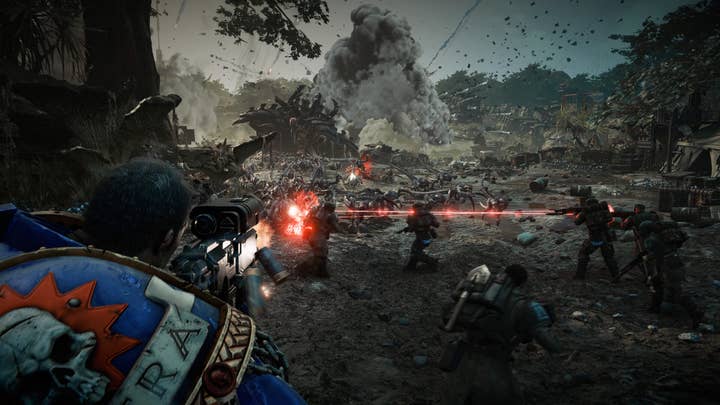
There have been changes, of course. While Saber is now larger than it was before being acquired by Embracer, it's still smaller than it was at the start of 2024 due to its former parent keeping a number of studios. This has also necessitated some alterations in certain territories.
"A small, relatively small percentage of our studios and our staff is in Russia, and ultimately we ended up moving everybody to a contractor basis because of political sensitivities and not wanting to have direct ownership of assets in Russia," explains Karch. "But these are people that I've worked with since I was in my 20s and I wasn't about to abandon them, but I was feeling a lot of pressure from Embracer to cut off those ties as much as possible.
"I don't know if we're the largest independent developer in the world right now but after taking Saber back, we might be"
"I don't really want to get too much into the political aspects of it other than to say that… I feel badly for everybody that's involved in what's going on in that part of the world. I don't think anybody wants that. We've had people who work for us who protested and been put away. These are people that are family to me and I wasn't about to abandon them."
We've already published Karch's comments on Embracer's restructuring and the troubles that led to it. As someone who was directly involved in the process, he recalls pitching the idea of buying back Saber Interactive to Embracer CEO Lars Wingefors.
"We had to run a process, see what numbers come in and then I'd have the opportunity to buy back the company," Karch says. "I listed the assets I wanted to take with us — this was about November of last year, I left my position as CEO and I focused on basically putting together a deal that at the moment is fully funded by me, to take the company back. And that's what we did and we leave on great terms."
He adds that it helps that Saber was one of the first major acquisitions during Embracer's six-year spending spree.
"I got lucky because I got in when the share price was [very] low. We got shares, I got cash, I did very well on my deal. Well enough [that] I'm able to buy back the company. Of course, we're spending less on it than we sold it for, at least in terms of actual cash."
The economics around Saber's acquisition and sale are still a little unclear. Embracer bought the company in a deal worth $525 million, encompassing $150 million in cash plus up to $375 million in performance-based earn-outs (although it's unknown how much of the latter has been paid). Meanwhile, Karch bought for a reported $247 million.
Given his enthusiasm about reclaiming his company's independence, and the fact Saber had been expanding prior to its own acquisition, we ask why the firm sold to Embracer in the first place. Karch explains that, in Embracer, he saw the chance to be "part of something bigger."
In 2020, Saber was still enjoying the success of 2019's World War Z — a game that Karch estimates returned 15 times its costs of around $12 million. After this, the company released Snowrunner, which he says performed even better. At the time, Karch was keen to build on this further but needed a partner who had the capital and the resources to help Saber grow.
"I think we have the potential to kind of change the way games are made"
"I was basically on a treadmill," he says. "You're getting your game done, you're shipping it, hoping you get all your milestone payments and then, if you're lucky, the game makes money.
"When I joined Embracer, part of my motivation was [to] go out and find other studios like me, studios that are really talented that nobody's given the time of day. Maybe in parts of the world, the locations where they're not able to do biz dev or they can't get the suit from Harvard who works for a publisher in California to trust them with doing anything. I wanted to give these guys a chance to build the game that they would never be able to build on their own, because they're going to be scrambling to keep the lights on from project to project without ever making any progress. That was for the most part my philosophy, and what I wanted to achieve. And by and large, we were successful in that.
"I wanted to grow, and I know the business of keeping costs under control, and making games which can compete with what other people are doing, for budgets that would make EA or Take-Two cry. And that's what we've been doing."
While Karch has funded the reclamation of Saber Interactive so far, he's hoping to find a minority investor that can help take the company forward.
"I think we have the potential to kind of change the way games are made," he concludes. "Given the escalating costs and our ability to control them in a way which is meaningful, and our ability to create high quality [products], we’ve positioned ourselves really well to bring in a few smart people that could contribute, and some capital to fund other projects, to slowly but smartly grow and to enable us to have a continual flow of content.
"We don't want to be – and I never wanted to be – the next Activision. That was never our ambition. Our ambition is to create great content, varied content, and to entertain people while also feeding ourselves in a meaningful way. That’s where we’re going."
Sign up for the GI Daily here to get the biggest news straight to your inbox
